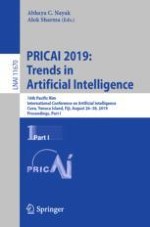2019 | OriginalPaper | Chapter
Learning Individual and Group Preferences in Abstract Argumentation
Authors : Nguyen Duy Hung, Van-Nam Huynh
Published in: PRICAI 2019: Trends in Artificial Intelligence
Publisher: Springer International Publishing
Activate our intelligent search to find suitable subject content or patents.
Select sections of text to find matching patents with Artificial Intelligence. powered by
Select sections of text to find additional relevant content using AI-assisted search. powered by
